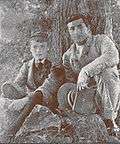John Gambril Nicholson

John Gambrill (Francis) Nicholson (6 October 1866 – 1 July 1931) was an English school teacher, Uranian poet, and an amateur photographer. He was the quintessential Uranian, forming the center of that semi-underground world, and frequently writing introductions for and receiving dedications from his peers.
Biography
John Gambrill Nicholson (the Francis was added later and the -ll/-l spelling varied over the years) was born at Saffron Walden, Essex, the son of an ironmonger's assistant.[1] He was educated locally at the King Edward VI Grammar School before entering upon his career (without any formal qualification) as an English Master at various schools in England and Wales: Buxton (1884–7); Ashton (1887–8); Rydal Mount School, Colwyn Bay (1888–94), where he also coached the football team; Arnold House School, Chester (1894–6); Stationers' School, Hornsey, north London (1896–1925, retired).[2]
His first book of poems Love in Earnest (1892) was dedicated to the memory of his mother, but the first section, a sequence of 50 numbered sonnets (which open with "Some lightly love, but mine is Love in Earnest -/My heart is ever faithful while it hears/An echo of itself in thine, though years/Should pass ere its full passion thou returnest"), was dedicated to "W.E.M." This was the flaxen-haired blue-eyed William Ernest Mather (1877–99)—second son of Sir William Mather—a pupil of his at Rydal Mount School 1888–90, who died young after being thrown from his horse[3] A photograph of Nicholson with Ernest, taken at Llandudno in June 1889, was published in The Book Collector (Summer 1978).[4] The dedicatees of other individual poems, referred to only by their initials, can be identified in many cases from the school register.[5]
Nicholson's second volume of poetry A Chaplet of Southernwood (1896), celebrated the beauty of another Rydal Mount pupil (1891–94), William Alexander (Alec) Melling (1878–1962).[6]
A third volume of verses A Garland of Ladslove (subtitled "Verses for Victor / To F.V.R. / (1902–1910)" was written for Frank Victor Rushforth (1888–1945), who entered the Indian Civil Service after university. As d'Arch Smith writes: "Nicholson's friendship with Victor began when the boy was thirteen. It was not altogether a happy relationship for it laboured under the usual difficulty that the boy was not able to respond to the ardour of Nicholson's passion.".[7] "Southernwood" and "Ladslove" are alternative English names for the aromatic plant from southern Europe Artemisia abrotanum.
Nicholson's semi-autobiographical novel Romance of a Choir-Boy was written between 1896 and 1905 but not published until privately printed in 1916. In it his alter ego protagonist Philip Luard chastely pursues the unresponsive twelve-year-old Teddy Faircloth of the title, despite his friend Gerrard urging him to a more sensual approach. The novel ends with the quotation: "Physical intimacies are but surface emotions, forgotten as soon as they are satisfied; whereas spiritual intimacies live in the heart, they are part of our eternal life, and reach beyond the stars."
Nicholson was a member of the Order of Chaeronea, a secret society for homosexuals founded in 1897 by George Ives.[8]
Works
- Love in Earnest: Sonnets, Ballades, and Lyrics (London 1892)
- A Story of Cliffe School (Bradford c.1895)
- A Chaplet of Southernwood (Ashover [Derby] 1896)
- In Carrington's duty-week : a private school episode (London n.d. [1910]) — Internet Archive e-book
- A Garland of Ladslove (London 1911)
- Romance of a Choir Boy (London 1916)
- Opals and Pebbles (London 1928)
References
- ↑ Birth certificate
- ↑ See Frederick Rolfe: Letters to R.M. Dawkins" ed. Cecil Woolf (London 1962)
- ↑ Manchester Guardian 6 November 1899
- ↑ Surprisingly Nicholson has inscribed it with Ernest's date of birth as 18 April 1876, instead of the correct 1877 (as shown on his birth certificate).
- ↑ The Centenary Register of Rydal School 1985 ed. G. Mayall & J. Pepper (Colwyn Bay 1985)
- ↑ See Timothy d'Arch Smith Love in Earnest (London 1970)
- ↑ Love in Earnest (1970), p. 128. See also Miriam J. Benkovitz: Frederick Rolfe: Baron Corvo (New York 1977), pp. 156, 247–8, where Victor's surname is disguised as "Rushmore", although in Garland the first letter of each line in the poem A New Vista spells out Victor's full name
- ↑ Edsall, Nicholas C. (2003), Toward Stonewall: Homosexuality and Society in the Modern Western World, University of Virginia Press, p. 160, ISBN 0-8139-2211-9
- D'Arch Smith, Timothy (1970). Love in Earnest. London: Routledge & Kegan Paul.